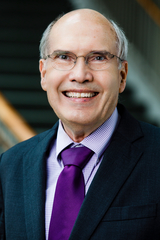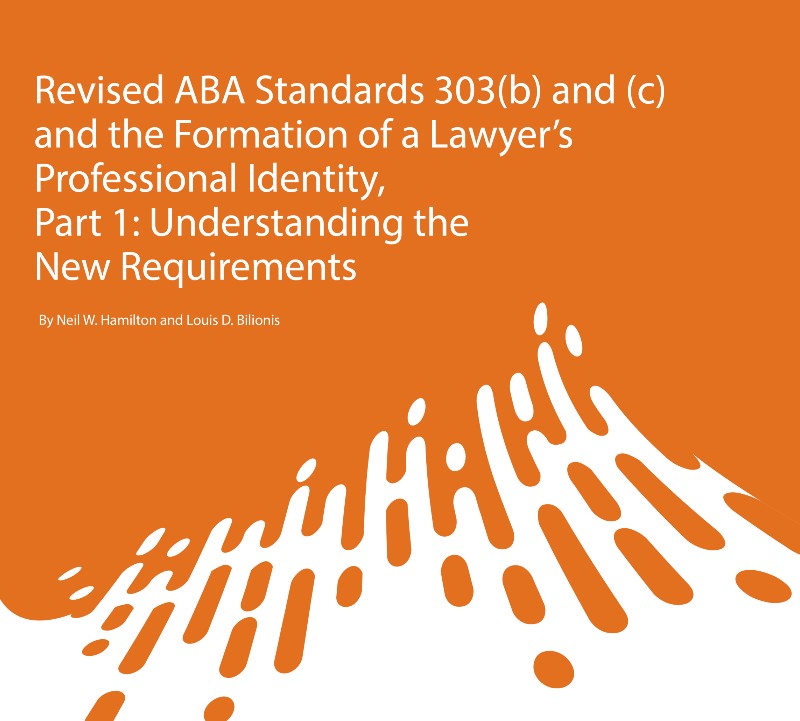By: Neil Hamilton, Holloran Professor of Law and Co-Director of the Holloran Center for Ethical Leadership in the Professions, University of St. Thomas School of Law
Accreditation Standard 303 requires that each law student shall complete a course of at least two credit hours that includes instruction on the values and responsibilities of the legal profession. Interpretation 303-6, adopted in 2022, now requires that the values and responsibilities of the profession to which students are introduced in Professional Responsibility must include the importance of cross-cultural competency and the obligation of lawyers to promote a system that provides equal access and eliminates bias, discrimination, and racism in law.
In the fall of 2023, I changed my three-credit Professional Responsibility course with 68 students to meet the new Interpretation 303-6 requirement in the context of a community or practice that fosters each student’s professional identity regarding the values and responsibilities above. There is a growing body of empirical scholarship pointing toward the importance of communities of practice (CoP) in terms of how professionals define their work and make the discretionary calls involved in the work. A community of practice is a persistent, sustaining social network of individuals who share and develop an overlapping knowledge base, set of foundational values, and experiences focused on a common practice. [One of my latest articles sets forth an extended analysis of this experiment. See Neil Hamilton, Professional Responsibility and Professional Identity Formation in a Community of Practice with Alumni, 20 UNIV. ST. THOMAS L.J. (forthcoming 2024).]
I formed communities of practice by putting the students in teams of four based on each student’s post-graduation area of employment interest and assigning an alumni coach practicing in the team’s area of interest. The team had to discuss with the coach four professional identity formation topics covering discretionary calls of lawyering in the practice areas. The fourth topic for the teams and coaches to discuss and reflect upon focused on cross-cultural competency, equal access, and the elimination of bias, discrimination, and racism in the team’s practice area.
The syllabus assignment for the fourth essay is below.
“This essay may be challenging for the team and the coach. For our profession and our law school, a core guiding principle is to develop cross-cultural competency, and a core value is to promote a legal system that provides equal access and eliminates bias, discrimination, and racism. Team members have been experiencing different types of communities of practice both inside and outside the law building. The team should discuss, deliberate, and reflect on what team members have observed that various communities of practice are doing with respect to this guiding principle and core value. What is each team member doing? What is a next step for this academic year to grow to a later stage of development? The team must interview their coach for this assignment.”
Overall, the teams and coaches had excellent discussions on this topic. Some of the teams and coaches commented that it is a challenging topic, but an important one. A number of essays urged openness about these topics. There were a number of suggestions on how to approach the topic with others including using one-on-one conversations rather than larger group conversations. Another frequent observation was a version of “go where they are” in terms of these conversations, and to listen and understand your conversational partner(s), not to judge them.
The points that the essays raised on the topics of developing cross-cultural competency and promoting a legal system that provides equal access and eliminates bias, discrimination, and racism in the law have some significant overlap on all three of those topics. Here are the most common overlapping themes.
- Take specific steps (small steps) to expose yourself to people of different cultures than your own and reflect on what you experience. The major point is to get out of your personal and professional bubble. For example, “get off the bus, and go into stores that serve people of other cultures.”
- Exercise authentic curiosity about these other cultures.
- Be present and listen actively to speakers from other cultures.
Note that from an enlightened self-interest standpoint, it is becoming more common in an interview, particularly for positions involving people from other cultures, to have a question about what the interviewee is doing specifically to increase cross-cultural competency. It is good to have a story of what you are doing.
The students’ essays based on their discussions with their coaches provided the following suggestions for law students/lawyers on the three main topics:
Developing Cross-Cultural Competency
- Seek out individuals who are different from you in your community and engage them in a conversation. For example, in our community, seek out an LL.M. student.
- Seek volunteer/public service experience in a community that is different from your own. For example, for transactional lawyers, provide legal assistance to minority businesspeople.
- Take a Clinic or an Interviewing and Counseling course.
- Learn another language. At least learn a few important introductory phrases like “Hello, how are you? My name is _____. What is your name?”
- When creating an event, consider a step to make it more inclusive.
- Be patient and especially present with active listening when interacting with a person of a different cultural background.
Promoting Equal Access
- Observe and be mindful of deficiencies in equal access in your practice area, and go the extra mile in your communication and attention when you see situations where cultural differences make it challenging for people of different cultures.
- If you see deficiencies in equal access in your practice area, say something. Talk to people about possible solutions.
- Do pro bono each year that is directed to address the deficiencies in equal access that you are experiencing.
Promoting a Legal System that Eliminates Bias, Discrimination, and Racism
- The major suggestion was to be mindful when you see systemic problems and to try to take even a small step to address the problem you see. For example, a prosecutor pro-actively tries to look at data to make sure that the dispositions she is offering are not being affected by race/ethnicity/gender.
- Join (or form) a group that is trying to do law reform in your area of practice.
- When you see biased or discriminatory conduct, speak up in a professional manner.
Reflecting on the essays, I think that the most important benefit is that each student articulated one concrete step to take to grow to the next level on this challenging topic. Another major benefit is that the practicing alumni lawyers provide credibility that this challenging topic is important for the practice of law, and is not just a topic that professors are imposing on students. In addition, this community of practice approach has the additional benefit of causing practitioners to discuss and reflect on the topics assigned to the teams.
If you have any questions or comments about this post, then please contact me at NWHAMILTON@stthomas.edu.

Neil Hamilton is the Holloran Professor of Law and Co-Director of the Holloran Center for Ethical Leadership in the Professions at the University of St. Thomas School of Law in Minnesota.



